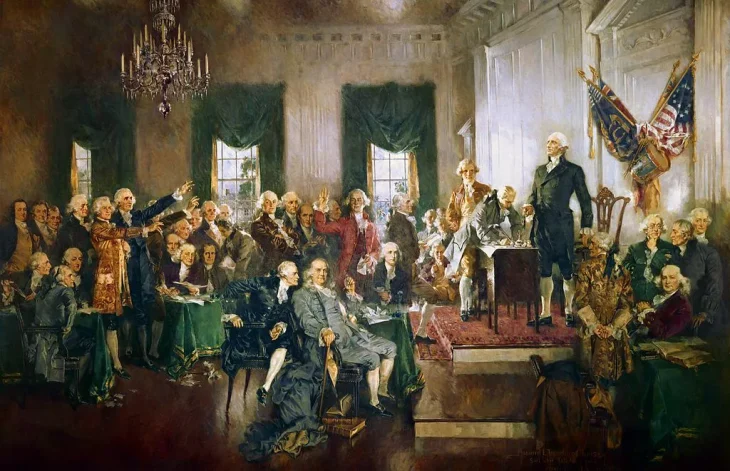
Word of the Day: Bellwether
Today’s word of the day is bellwether, thanks to Dictionary.com. Bellwether is a noun that means “a person or thing that shows the existence or direction of a trend” (https://www.dictionary.com/e/word-of-the-day/). The website goes on to add these details about the word: “First recorded around 1400–50. A bellwether originally meant ‘a male sheep that leads the flock, usually bearing a bell.’ Formed from the words bell and wether, ‘a castrated male sheep,’ both with Old English origins” (ibid.).
The etymology website says that it entered the language “mid-14c. (late 13c. in Anglo-Latin; late 12c. as a surname), from bell (n.) + wether. The figurative sense of ‘chief, leader’ is attested from mid-14c.” (https://www.etymonline.com/search?q=bellwether). It also suggests that it could be written as bell-wether.
The word wether means “’male sheep,’ especially a castrated one, Old English weðer ‘ram,’ from Proto-Germanic *wethruz (source also of Old Saxon wethar, Old Norse veðr, Old High German widar, German Widder, Gothic wiþrus ‘lamb’), literally ‘yearling,’ from PIE root *wet– ‘year’ (source also of Sanskrit vatsah ‘calf,’ Greek etalon ‘yearling,’ Latin vitulus ‘calf,’ literally ‘yearling’)” (https://www.etymonline.com/word/wether).
Of course, we have to note that the term is not “bell weather,” though you can find people spelling it that way (https://tradestie.com/apps/user/arpanphull/economy-bell-weather-stocks/; https://bobistheoilguy.com/forums/threads/the-bellweather-stock-i-will-watch-to-see-how-the-us-and-global-economy-is-doing.376424/).
On this date in 1807, Thomas Jefferson signed into law the Act Prohibiting Importation of Slaves. Just two months later, Britain’s An Act for the Abolition of the Slave Trade went into effect. Both of these acts did not outlaw slavery, just the trade in slaves.
You might wonder why 1808. The US Constitution, in Article 1, Section 9, specifically refers to 1808: “The Migration or Importation of such Persons as any of the States now existing shall think proper to admit, shall not be prohibited by the Congress prior to the Year one thousand eight hundred and eight” (https://en.wikipedia.org/wiki/Article_One_of_the_United_States_Constitution#Section_9:_Limits_on_Congress). Article 5, which addresses amending the Constitution, also makes reference to 1808: “Provided that no Amendment which may be made prior to the Year One thousand eight hundred and eight shall in any Manner affect the first and fourth Clauses in the Ninth Section of the first Article,” with the ninth section of the first article being the one about “importation of” persons (https://en.wikipedia.org/wiki/Article_Five_of_the_United_States_Constitution).
Three anti-slavery acts had preceded the 1808 bill. In 1794, Congress Slave Trade Act, “which prohibited making, loading, outfitting, equipping or dispatching of any ship to be used in the trade of slaves, essentially limiting the trade to foreign ships” (https://en.wikipedia.org/wiki/Act_Prohibiting_Importation_of_Slaves). In 1797, Congress created the Northwest territory, making slavery illegal there (though in 1798, Congress created the Mississippi territory, allowing slaves to be transported to the new territory). In 1800, “Congress outlawed U.S. citizens’ investment in the trade and the employment of U.S. citizens on ships involved in the trade” (ibid.).
In his message to Congress in December of 1806, President Jefferson said, “I congratulate you, fellow-citizens, on the approach of the period at which you may interpose your authority constitutionally, to withdraw the citizens of the United States from all further participation in those violations of human rights which have been so long continued on the unoffending inhabitants of Africa, and which the morality, the reputation, and the best interests of our country, have long been eager to proscribe” (ibid.).
Jefferson’s record on slavery is kind of mixed. He said a lot of things against slavery, like that it was a moral evil for which the country would be held to account by God. He reportedly bought slaves to reunite families. He supposedly worked to reduce the number of his slaves. Some of his political positions related to a fear that going to hard against slavery might risk breaking up the union. He owned slaves throughout his adult life.
I wonder what was going on in Jefferson’s mind. He wrote letters talking about his frustration over his inability to get slavery banned. He expressed fear of a coming race war. He expressed concern over the denial of human rights to some people. He must have felt, at the end of his life, like he had failed. He could have been a real bellwether, signaling to the world that slavery was both wrong and doomed. But he did not succeed.
Today’s image is from https://www.thoughtco.com/constitutional-convention-105426. It’s a picture of the members of the Constitutional Convention. There were 55 delegates to the convention, though only 39 signed the document. Of the 55, 25 were slaveholders.